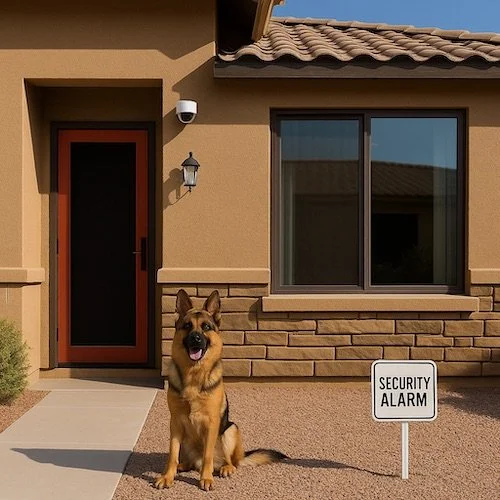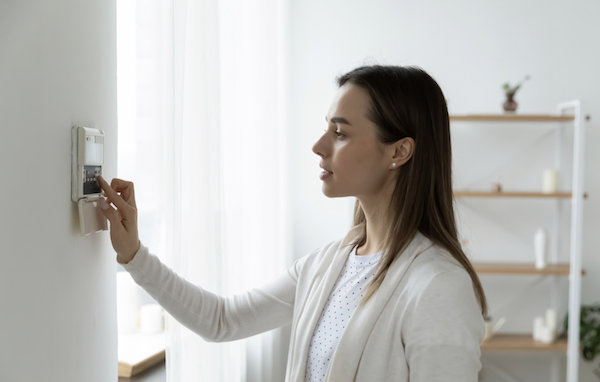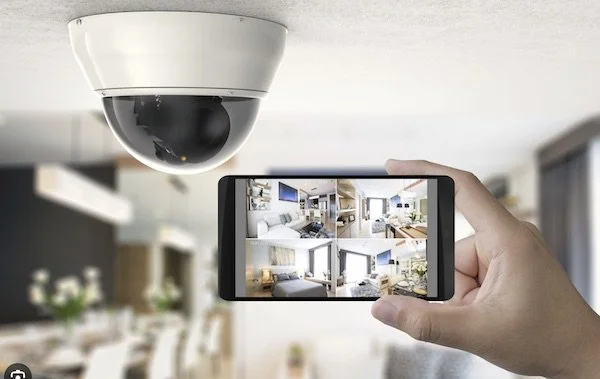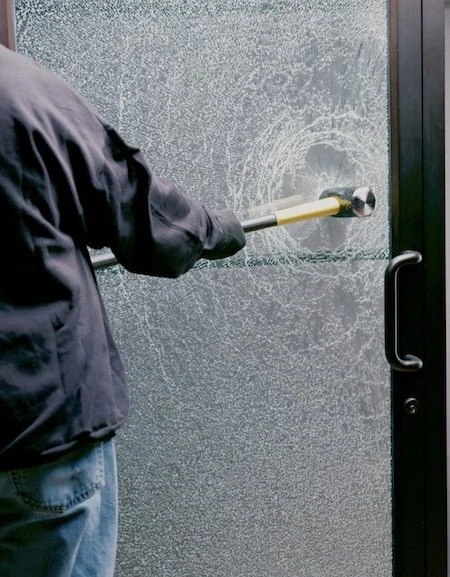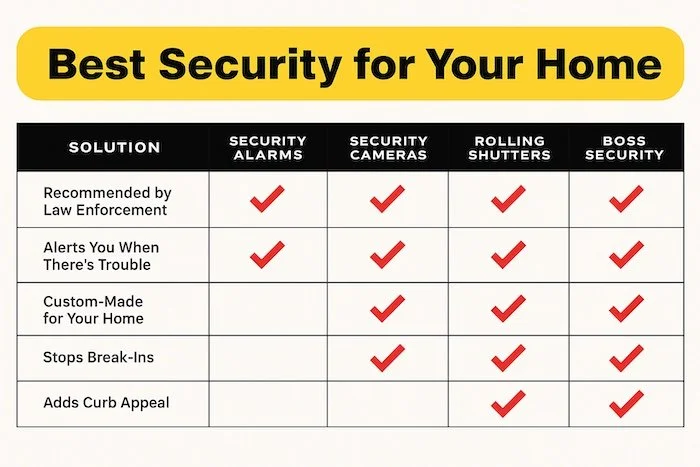Choosing the right way to protect your home starts with understanding what each option really does. Security cameras keep watch. They let you see what’s happening, anytime, anywhere. Top brands connect easily with your smart home systems so you’re always in the loop. Alarms can scare off intruders and alert you to dangers like carbon monoxide. But alarms go off after someone’s already inside. They’re best used alongside physical protection, not as your only line of defense. Security screens do what cameras and alarms can’t – they physically keep people out. Our custom high-strength screens stop break-ins without ruining your home’s look or blocking fresh air. As for security film, it helps hold glass together if it breaks, but it won’t stop a determined intruder. Security screens provide real, lasting protection.
Each method has its place. The smartest choice? Layer them. But if you’re picking just one, choose the option that keeps people out in the first place.
Understanding the Key Features of Home Security Systems
According to the FBI Uniform Crime Reporting; UNC Charlotte Department of Criminal Justice & Criminology study, homes without security systems are 300% more likely to be burglarized compared to homes with security systems. Let’s explore the main ingredients of a good home security system. Here are the main types of home security systems:
security alarms
security cameras
security film
security bars
rolling shutters
security screens for windows and doors
Since bars are a fire hazard and rolling shutters are impractical as they only protect when completely down - we will only cover the rest of the options.
Why You Need Layers of Defense
Relying on one security measure is like locking your front door but leaving the windows wide open Data from Deep Sentinel shows classic alarms often take too long to respond—and in many cases, police don’t even show up unless it’s a verified threat If an alarm just sirens, a thief inside for under 10 minutes can be well gone before help arrives. Insurance industry insiders are also stating that plain alarms or cameras without extra layers are now often treated as low-priority, making them essentially useless in quick-hit break-ins.
Security analysts (notably in Global Guardian's review of elite residential security) warn that even luxury alarm systems can be bypassed unless part of a multi-layered setup. So, if you think ‘Once I’ve got an alarm, I'm protected’—think again. These burglars are bold; they know how systems tick. To really fend them off, stitch your security together. Lock the door, turn on the lights, get a camera, and plug it into a live-monitored service or alert-capable team. One thing alone? Not enough for today’s thieves.Each layer covers what the others miss. Cameras watch. Alarms warn. Security screens physically keep them out. Together, they make your home a place burglars won’t bother with.
The Role of Alarm Systems in Keeping Your Home Safe
Modern alarm systems come with a wide range of features to keep your family and property safe. For example, smart home security systems paired with smart locks can reduce home break-ins by up to 33%. Using a mobile app to control your alarm system can lower security risks by 20%, and smart locks connected to these apps can increase the reliability of your alarms by around 30%.
Personally, at my own home and office, I use SimplySafe and Blink. SimplySafe offers professional monitoring with an easy DIY setup, but it does come with monthly fees if you want full features. Blink is great for its low upfront cost and simple integration with cameras, though it doesn’t offer the same level of professional monitoring as more comprehensive systems. Both have their pros and cons, but the key is choosing what fits your family’s needs and budget while giving you peace of mind.
The Effectiveness of Alarm Sirens and Monitoring Services
Integrating alarm sirens with carbon monoxide detectors not only boosts security but also protects your family from hidden dangers. Pairing heat detection sensors with security window film helps preserve wood structures from damage. Alarm sirens alone can increase your home’s safety and security by an additional 20%, providing a robust line of defense against crime.
How to Choose the Right Alarm System for Your Home
When it comes to choosing the right alarm system, I always tell folks to balance three things: budget, ease of setup, and reliability. First, look at what you actually need. If you’re on a tight budget, a simple alarm system with door and window sensors can go a long way. Make sure it’s easy to install yourself so you’re not paying extra for setup.
Second, check whether the system has battery backup and cellular connectivity. That way, if your power goes out or your Wi-Fi drops, your home is still protected. A lot of people don’t think about that – but the truth is, emergencies don’t wait for your internet to be working properly.
Finally, choose a system that can grow with you. Maybe you start with door and window sensors today, but down the line, you’ll want to add cameras, motion detectors, or smart locks. Pick a platform that allows you to add those features without having to rip everything out and start from scratch.
At the end of the day, the best alarm system is the one that fits your home, your lifestyle, and your peace of mind – without draining your bank account or leaving you vulnerable if the power goes out.
The Advantages of Security Cameras for Monitoring
Adding security cameras to your home is one of the smartest decisions you can make. Studies show that combining wireless cameras with strong security screens can reduce threats by up to 25%. In Australia, homeowners using advanced security screens have seen a 20% drop in break-ins. Cameras act as both a deterrent and an extra set of eyes, giving you peace of mind whether you’re home or away.
Real-Time Alerts and Surveillance Technology
The real benefit of modern security cameras is their ability to send real-time alerts straight to your phone. This gives you 24/7 visibility over your property, no matter where you are. In fact, commercial-grade systems have been shown to improve reliability by 30% compared to basic setups. When choosing cameras, look for features like motion detection, two-way audio, and infrared night vision for full coverage day or night.
Evaluating Different Types of Cameras
There’s a lot out there – from simple battery-operated indoor cameras to wired outdoor cameras with floodlights. Battery-powered cameras are quick to install but need recharging, while wired options take more effort upfront but provide consistent power. Think about what fits your lifestyle and whether you want continuous recording or motion-activated clips.
Installation Considerations for Optimal Coverage
Proper placement is everything. Make sure cameras cover main entry points like doors, garage, and backyard gates. Integrating your cameras with home automation systems can improve security efficiency by up to 35%, giving you faster alerts and smoother operation. Also, check if your system has cellular backup so it still works if Wi-Fi or power goes down. That alone can improve emergency response times by around 20%. The above-mentioned SimpliSafe andBlink both combine alarms and cameras and are both acceptable.
At the end of the day, the right camera system is one that fits your budget, is easy to maintain, and keeps your family protected – without adding stress to your daily life.
The Role of Security Film in Protecting Your Property
Security film is one of those quiet heroes in the world of building protection. It’s a clear layer applied directly to your windows, holding the glass together if it’s struck or shattered. While it doesn’t make your windows unbreakable, it does buy you time – and sometimes, that’s all you need to keep your property secure.
At Boss, we offer security film as part of our solutions. It’s especially useful for large commercial buildings that aren’t under severe threat of forced entry or violence but still need an added layer of protection. For example, security film can prevent injury from flying glass during accidents, storms, or minor break-in attempts. It also adds a level of privacy and can block UV rays, protecting interiors from sun damage.
If you’re managing an office building, storefront, or school, security film is a practical, cost-effective way to improve safety without the need for major structural changes. It’s not as robust as security screens when it comes to stopping a determined intruder, but it absolutely strengthens your windows against impacts and delays entry, giving law enforcement or your monitoring service more time to respond.
In the end, it’s all about using the right tool for the right job. Security film gives you that extra bit of peace of mind, especially when paired with cameras, alarms, and smart locks for a complete layered security approach.
Benefits of Security Window Film Installation
Installation lowers expenses integrating smart device with amazon alexa platform. It improves security glazing efficacy and riot glass endurance significantly. Responsive customer service ensures reliable guidance during installation projects today.
Why Security Screens Are Essential for Your Home or Business
Security screens are, hands down, one of the strongest investments you can make for your property’s protection. Unlike regular screens, these are built with reinforced mesh and solid frames that can withstand force and attempts at entry – without sacrificing airflow or visibility.
What Are Security Screens?
Security screens might look like regular screens at first glance, but they’re built for a whole different purpose. Essentially, a security screen is a tightly woven stainless steel or aluminium mesh set within a reinforced frame. Unlike standard bug screens, these are engineered to withstand serious force – from kicks and punches to crowbars and knives.
They’re designed to keep intruders out while still letting fresh air and natural light in. You can lock your main doors open behind them, enjoy the breeze, and feel confident that no one’s getting through. Security screens are available for doors, windows, and patio enclosures, giving you full coverage throughout your property.
At the end of the day, security screens are about combining strength and practicality. You get the safety of bars without feeling closed in, and the peace of mind knowing your family or business is protected every hour of the day.
What Type of Security Screens Are Out There?
At Boss, we offer a full range of security screens, including security screen doors, security doors, and security screen windows. Security screen doors give you the freedom to keep your main door open for fresh air while knowing no one’s getting in uninvited. They’re built to handle kicks, pry attempts, and even heavy impacts, all while looking clean and modern.
Our security doors take it a step further, combining strong steel or aluminium frames with reinforced mesh or panels. These are ideal for front entries, back patios, or garage access doors – anywhere you want maximum protection without installing something that looks like a prison gate.
And then there are security screen windows. These give you peace of mind that no one can just cut through and climb in, yet you can still keep your windows open for ventilation. They’re especially important for ground-level windows or basement windows, which are common points of entry for intruders.
The reality is, security screens aren’t just about keeping criminals out. They also protect your family and employees from stray golf balls, severe weather debris, or accidents that could shatter glass. They’re a simple, effective, and elegant way to add a robust layer of security to your home or business – without giving up the feeling of openness and light.
If you’re serious about protecting what matters most, security screens should be at the top of your list.
When to Choose Each Option for Your Home
Choosing the right security setup depends on what you’re protecting and how you live.
If you want to keep an eye on things, security cameras are a great start. They let you see what’s happening around your property anytime, anywhere. But remember – cameras only watch; they don’t stop someone from getting in.
If you’re looking to deter intruders and get alerts fast, alarms are useful. They scare off some burglars and notify you or emergency services when there’s a break-in. Just keep in mind, alarms go off after someone’s already inside.
If you want to physically keep people out, security screens are your strongest option. They act as a barrier, stopping intruders before they get in, while still letting in fresh air and light. Unlike cameras or alarms, security screens don’t just warn you about danger – they block it.
The smartest approach? Layer your security. Cameras watch, alarms warn, and security screens keep them out. If you have to pick just one, go with what physically prevents the break-in in the first place.
Cost Considerations for Home Security
When it comes to securing your home, every dollar counts. A basic home alarm kit can lower your upfront costs by about 25%, making it a solid entry-level choice. DIY systems like Ring offer roughly 20% savings compared to professionally installed setups. Even adding security film to your windows can save you about 15% by reducing potential damage – a small step with meaningful protection.
Budgeting for Cameras, Alarms, and Films
Installing window sensors can cut emergency response times by 15%, thanks to their fast communication features. Companies like ADT claim to reduce overall security costs by about 20%, largely through expert installation and monitoring. And security doors? They’re a bigger upfront investment but provide up to 25% stronger protection than standard doors, making them worth serious consideration.
Long-Term Savings vs. Upfront Costs
At Boss Security Screens, we design our screens to resist rust up to 25% better than regular options, protecting your investment for years to come. Adding security film to your glass can extend its life by about 15%, reducing the need for early replacements. Motion detectors also keep repair bills down, saving around 20% in maintenance costs over time. The security screens would be a serious investment. Ultimately, you need to consider whether you’re willing to pay $20-$60/ month for being alerted of a crime happening with alarms or $100-$200/month (financing) to prevent the crime in the first place with security screens.
Discounts and Insurance Benefits
Don’t forget to check for discounts on smart security systems – many providers offer up to 15% off when you use cloud storage plans. Your insurance company may also lower your premiums by around 10% if you install devices like cellular smoke detectors. And window films? They often deliver 20% savings by reducing glare and heat, which adds comfort while protecting your interiors.
Assessing Your Specific Security Needs
Smart security system reduces home invasion risk by 40% annually. DIY home security saves up to 30% on overall budget. Window security screens boost safety by 35% with minimal expense.
Identifying Vulnerabilities in Your Home
The first step to real security is understanding where you’re exposed. Walk around your home like someone trying to break in. Are there windows hidden from the street? A side gate with a loose latch? Maybe your front door has a basic lock that could be kicked in within seconds.
Don’t forget sliding glass doors – they’re often the weakest point. Check if your security cameras actually cover blind spots or if there’s an easy path someone could use to approach unnoticed. Look at your landscaping too. Overgrown bushes near windows might give someone the perfect hiding place.
If you’re not sure what to look for, ask a security professional to do an assessment. It’s always better to know where you’re vulnerable now rather than find out after the fact.
Tailoring Security Solutions to Fit Your Life
There’s no one-size-fits-all when it comes to security. Your lifestyle and environment determine what works best. Alarm systems alone can improve emergency response by around 25%, but pairing them with backup options like security screens reduces overall risk by up to 30%. Layering your defenses simply works better.
FREQUENTLY ASKED QUESTIONS
Why a Professional Assessment Matters
You might think your cameras and alarms cover everything, but a professional will see what you don’t. Experts can validate if your cameras are positioned effectively, or if you’re relying on outdated systems. An independent assessment ensures there are no leaks in your security plan – because a single gap is all it takes.
What Makes a Security System Effective?
A solid system combines reinforced materials, fast alarm response, and smart sensors. It should keep you safe without compromising how your home looks or functions. High-strength security screens and custom doors, for example, don’t just protect against forced entry or extreme weather – they let fresh air in and keep your view clear, blending protection with daily comfort.
How Do Cameras Strengthen Your Security?
Security cameras are your eyes when you’re away. They provide real-time monitoring, alerts for unusual activity, and video evidence if something happens. The ability to check in remotely offers peace of mind – whether you’re at work or traveling.
Do Alarm Systems Really Deter Crime?
Absolutely. A loud alarm creates uncertainty for intruders and draws attention – two things criminals hate. When you combine alarms with strong physical barriers like security screens, you make your home or business a much harder target without sacrificing airflow or curb appeal.
Security Film or Security Screens – Which is Better?
Security film can help hold glass together on impact, but high-strength security screens go further. Made from US-woven stainless steel mesh, they act as a physical barrier against forced entry while still allowing visibility and ventilation. If you want long-lasting, reliable protection, screens are the clear choice.
How Much Do These Security Options Cost?
Prices vary based on design, materials, and installation complexity. Residential projects are usually more straightforward and cost less than commercial or government installs, which may require advanced specs or compliance with strict regulations.
While premium stainless steel mesh screens and doors are a bigger investment upfront, they pay off in durability, corrosion resistance, and aesthetic value. Ultimately, costs depend on your property size and specific needs, but a reputable security provider will tailor a solution that balances budget, protection, and style.
HAVE ADDITIONAL QUESTIONS? E-MAIL US AND WE WILL GET IN TOUCH WITHIN 10 MINUTES.
About the Author
James Kerr is the founder of Boss Security Screens and a mechanical engineer with over 25 years of experience in protecting families and businesses. His engineering background gives him a deep understanding of structural integrity, product design, and the practical realities of security solutions.
James believes true security comes from combining the right tools with common sense and preparedness. Known for his straightforward, no-nonsense approach, he focuses on solutions that work – without hype or fear tactics.
When he’s not working with homeowners to secure their properties, James enjoys spending time outdoors, flying, and making memories with his family. His mission is simple: to help people live with confidence, knowing that their homes and loved ones are protected day and night.


